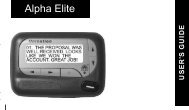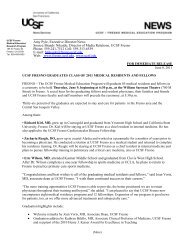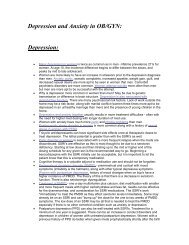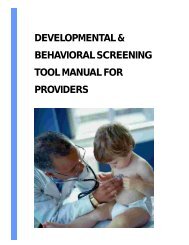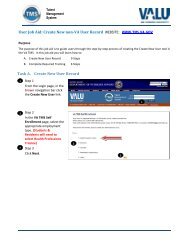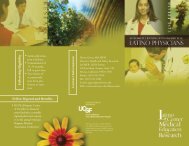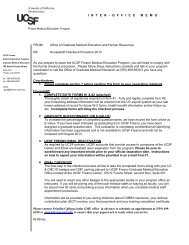UC W4NR Instructions - UCSF Fresno
UC W4NR Instructions - UCSF Fresno
UC W4NR Instructions - UCSF Fresno
You also want an ePaper? Increase the reach of your titles
YUMPU automatically turns print PDFs into web optimized ePapers that Google loves.
Supplemental <strong>UC</strong> W-4NR/DE4 2012 <strong>Instructions</strong> for<br />
Nonresident Aliens<br />
(Based on IRS Notice 1392)<br />
Nonresident aliens must follow special instructions<br />
when completing the <strong>UC</strong> W-4NR/DE 4 for<br />
compensation paid to such individuals as employees<br />
performing dependent personal services in the<br />
United States. Compensation for dependent<br />
personal services includes amounts paid as wages,<br />
salaries, fees, bonuses, commissions, compensatory<br />
scholarships, fellowship income, and similar<br />
designations for amounts paid to an employee.<br />
Are you a nonresident alien If so, these<br />
special instructions apply to you. Resident<br />
aliens should follow the instructions for<br />
the <strong>UC</strong> W-4/DE4.<br />
If you are an alien individual (that is, an individual<br />
who is not a U.S. citizen), specific rules apply to<br />
determine if you are a resident alien or a<br />
nonresident alien for federal income tax purposes.<br />
Generally, you are a resident alien if you meet either<br />
the “green card test, “or the “substantial presence<br />
test” for the calendar year. Any alien individual not<br />
meeting either test is generally a nonresident alien.<br />
Additionally, a dual-resident alien who applies the<br />
so-called “tie-breaker” rules contained within the<br />
Resident (or Residence or Fiscal Residence) article of<br />
an applicable U.S. income tax treaty in favor of the<br />
other Contracting State is treated as a nonresident<br />
alien. See IRS Publication 519 available at<br />
http://www.irs.gov/pub/irs-pdf/p519.pdf, for more<br />
information on the green card test and substantial<br />
test.<br />
What compensation is subject to<br />
withholding and requires a Form<br />
<strong>UC</strong> W-4NR/DE4<br />
Compensation paid to a nonresident alien for<br />
performing personal services as an employee in the<br />
United States is subject to graduated withholding.<br />
Compensation for personal services also includes<br />
amounts paid as a scholarship or fellowship grant to<br />
the extent it represents payment for past, present or<br />
future services performed as an employee in the<br />
United States. Nonresident aliens must complete<br />
Form <strong>UC</strong> W-4NR/DE4 so that the correct amount of<br />
federal income tax is withheld from compensation<br />
paid for personal services performed in the United<br />
States. The <strong>UC</strong> W-4NR/DE4 takes into account the<br />
restriction on a nonresident alien’s filing status, the<br />
limited number of personal exemptions allowed, and<br />
the restriction on claiming the standard deduction.<br />
Are there any exceptions to this<br />
withholding<br />
Yes, nonresident aliens may be exempt from wage<br />
withholding on the following amounts.<br />
Compensation paid to employees of foreign<br />
employers if such pay is not more than $3,000<br />
and the employee is temporarily present in the<br />
United States for not more than a total of 90<br />
days during the tax year.<br />
Compensation paid to regular crew members of<br />
a foreign vessel.<br />
Compensation paid to residents of Canada or<br />
Mexico engaged in transportation related<br />
employment.<br />
Certain compensation paid to residents of<br />
American Samoa, Puerto Rico, or the U.S. Virgin<br />
Islands.<br />
See Publication 519 to see if you qualify for one of<br />
these exemptions.<br />
Nonresident aliens may be exempt from wage<br />
withholding on part or all of their compensation for<br />
dependent personal services under an income tax<br />
treaty. If you are claiming a tax treaty withholding<br />
exemption, you must complete a Form 8233,<br />
Exemption from Withholding on Compensation for<br />
Independent (and Certain Dependent) Personal<br />
Services of a Nonresident Alien Individual and give it<br />
to your employer. Even if you submit Form 8233,<br />
the withholding agent may have to withhold tax<br />
from your income because the factors on which the<br />
treaty exemption is based may not be determined<br />
until after the close of the tax year. In this case, you<br />
must file Form 1040NR, U.S. Nonresident Alien<br />
Income Tax Return or Form 1040NR-EZ, U.S. Income<br />
Tax Return for Certain Nonresident Aliens with No<br />
Dependents, to recover any overwithheld tax and to<br />
provide the IRS with proof that you are entitled to<br />
the treaty exemption. See Publication 901, U.S. Tax<br />
Treaties, available at<br />
http://www.irs.gov/pub/irs-pdf/p901.pdf and<br />
Publication 519 for further information on treaty<br />
benefits.


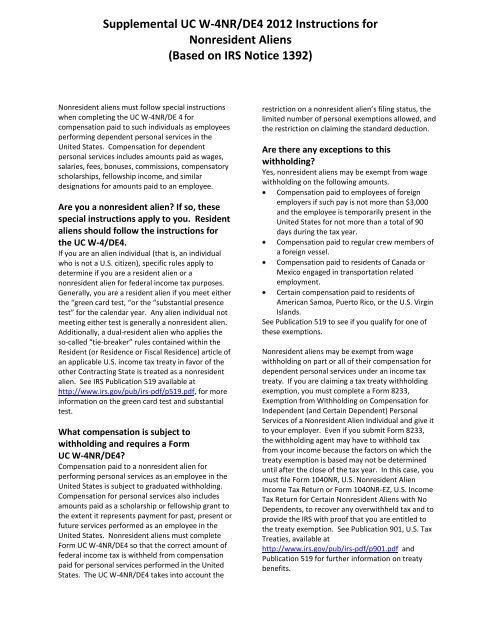

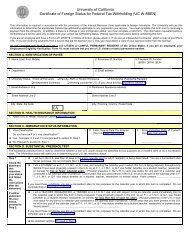
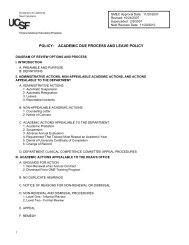
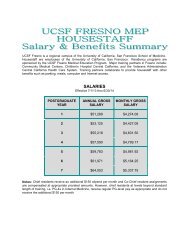
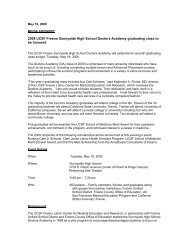
![Assistive Mobility Devices For Prevention Of Falls[1] - UCSF Fresno](https://img.yumpu.com/48127846/1/190x245/assistive-mobility-devices-for-prevention-of-falls1-ucsf-fresno.jpg?quality=85)
